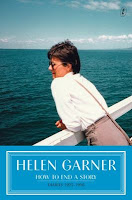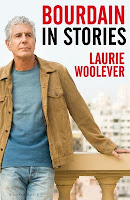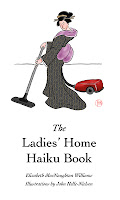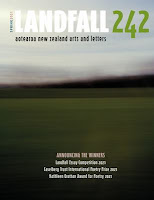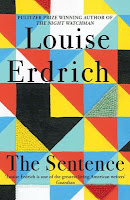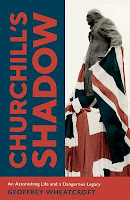>>Read Stella's review.
>>Take a look inside the suitcase.
>>A snip!
>>A reading of the French edition.
>>Inside the Villains.
>>Have a look inside the villains.
>>The House of Madame M.
>>Perrin enters the house.
| >> Read all Stella's reviews. | |
Inside the Suitcase by Clotilde Perrin {Reviewed by STELLA} Remember the fairy-tale inspired Inside the Villains, the slightly macabre House of Madam M, both from the clever pen and brush of French writer and illustrator Clotilde Perrin? Now, there’s an equally delightful new picture book — Inside the Suitcase. A small boy is going on a journey. He packs his suitcase. Click-clack! What will he need? Something warm? Something to wear if he needs to cool off? And some food — a cheese sandwich is just the right thing for a journey. Look under the flaps to see what is inside the suitcase. What’s this? A key. But a key for what? Filled with small clues and mysteries that will unfold as you turn the pages, lift the flaps (there are many on each page) and read the story, you will discover the perfect purpose for each item. The boy leaves his lovely red-roofed home to cross the ocean, suitcase clutched on his knees, to a land with a large rock behind which he finds a little house. Knock-knock! Look inside — there’s something in a locked cage — what could it be? The key comes in useful. It’s something delicious — sponge fingers, strawberry mousse and a chocolate dome (and did I mention a cherry on top!). Into the suitcase it goes — for later…. The boy walks on — up high into snowy peaks, so delightfully drawn that you can feel the icy air. Brrr. The boy thinks so too — luckily he packed something warm. Keep lifting the flaps on this page to discover some beautiful creatures swimming in the sea below. The boy will find an underwater world and an even tinier house. Knock-knock. There’s something very precious in this tiny house. Absolutely overjoyed, the boy pops it into his suitcase and walks on into a magical forest. But between the beautiful plants lurks danger. Our resourceful young fellow has just what he needs, in his suitcase, of course! On the run, he comes across another house — this one is slightly different from the others, and here he finds a seed. What might grow from this seed? He’ll have to go home and plant it! This is a charming story for curious young minds, with adventure and playful discoveries on every page and under every flap. Perfect! Wonderfully illustrated, beautifully designed and cleverly told. Click-clack. |
| >> Read all Thomas's reviews. | |
 | Essays: One by Lydia Davis {Reviewed by THOMAS} An essay is a literary form but a collection of essays is not a literary form, or, rather, a collection of essays, unless written specifically as a cohesive set, which is unusual for collections of essays and in which case they are not usually considered a collection of essays but something else, only becomes a literary form, and only if we stretch our concept of what constitutes a literary form, at the point at which the essays are assembled, selected and ordered by someone, plausibly not even the author of the essays, some time, perhaps some considerable time, after they were written, at various times perhaps over a considerable period of time, during which the author may or may not have changed her approach to whatever and however she writes and may or may not have written and had published any number of other literary forms, if she happens to be an author who also writes other literary forms. ‘Selected works’ is not a literary form, and essay collections often tend to be selected works, these works often having appeared in various periodicals or other platforms over the years preceding their collection, or, generally more accurately, selection. Reviewing a collection of essays, as an instance of a literary non-form, presents certain difficulties as the reviewer is denied the various familiar analytic tools that are dependent on form, usually ending up making some generalised statements about the author, her qualities and importance, and then garnishing these comments with snippets pulled from various of the works in the collection, each work of which could be analysed as a literary form but none of which tend to be so treated, except perhaps cursorily, due to lack of space and time, space and time being a single entity in writing as they are in physics. If a reviewer does not quite know how to approach the literary non-form of a collection of essays this is because a reader, of which a reviewer is merely a pitiful example, does not know how to approach a non-form. A reader has no obligations towards the collectedness of pieces towards which, severally, he may have obligations, but also, at least, thankfully, tools dependent upon the form of the several pieces, but what obligations does a reviewer have towards the collectedness of the pieces? It is hard to review something that you do not recognise as a thing. Lydia Davis is best known for the devastating precision of the sentences that comprise some of the shortest, sharpest stories you are likely to read, and for her subtle and precise translations of Proust, Flaubert, Blanchot, Foucault, Leiris and others. Her economy of expression astounds, whether that economy is displayed in a single-sentence fiction, indefinitely extended in a translation, or in such various essays as are collected in this book. The essays, which are of various forms, all concern the relationship between language and lucidity; they all concern writing: either writers or the practice of writing; they are all about reading (of which the practice of writing is a peculiarly freighted subset). The essays all both demonstrate and concern what we could call ‘the mechanics of form’, the way in which language, well used, creates, sharpens or transfigures meaning in literature. Davis shows us how to narrow our linguistic aperture in order to maximise our literary depth of field. She is full of good advice, suggestions for new reading, exemplary sentences and memorable observations: “If we catch only a little of the subject, or only badly, clumsily, incoherently, perhaps we have not destroyed it.” Because a collection is not a literary form, you have no obligation as a reader towards the totality of the volume, but there is much here to enjoy and discover, much that will sharpen your writing and your reading of the writing of others, much to return to and re-read. Most likely you will read it all. |
NEW RELEASES
The Books of Jacob by Olga Tokarczuk (translated by Jennifer Croft) $48>>The rise and fall of a messiah.
The Dawn of Everything: A new history of humanity by David Graeber and David Wengrow $75
This remarkable book challenges our received narratives of historical determinism, narratives that were devised in the eighteenth century as a conservative reaction to critiques of European culture inherent in the Indigenous cultures then entering European awareness. If we unshackle ourselves from thee preconceptions about human 'progress' and look more closely at the evidence, we find a wide array of ways in which humans have lived with each other, and with the natural world. Many of these can provide templates for new forms of social organisation, and lead us to rethink farming, property, cities, democracy, slavery, and civilisation itself.
>>All figured out.
Essays: Two by Lydia Davis $55
>>Read Thomas's review of the first volume.
How to End a Story: Diaries, 1995—1998 by Helen Garner $37
OUR FAVOURITE FICTION from the books we read in 2021 (click through to read our reviews):
1. The Sunken Land Begins to Rise Again by M. John Harrison
2. Crossroads by Jonathan Franzen
3. At Night All Blood Is Black by David Diop
4. Night Bitch by Rachel Yoder
5. Great Works by Oscar Mardell
1. The Employees by Olga Ravn (translated by Martin Aitken)
NEW RELEASES
>>And there are cards!!
>>How the book was printed.
| >> Read all Thomas's reviews. | |
Chasing Homer by László Krasznahorkai (translated by John Batki), with paintings by Max Neumann and music by Szilveszter Miklós {Reviewed by THOMAS} It seemed sometimes that they were even wanting the worst to happen, if only to be relieved of the terrible anticipation that the worst may happen. It seemed sometimes that the worst thing sucks everything else towards it, even our resistance to the worst thing, and the closer we get to the worst thing it seems the less we resist it, just when we would be better to resist it more, until we are drawn over the acquiescence horizon, so to call it, until we are drawn past the point at which the possibility of relief from the effort to resist is stronger than our exhausting effort to resist, the point at which we either try to resist more, which just increases the degree of relief offered by giving up, or we resist less, which draws us closer to giving up. We give up. Of course, we don’t want to be seen to be giving up, not even by ourselves, what we want is a way to be seen to be resisting when in fact we are giving up, what we want is some mechanism that will make it appear that, when the worst happens, it might not have been as bad as it could have been even though it is worse than we could have imagined. How could that *they* have become a *we* so easily? A threat presses unrelentingly on the narrator of Krasznahorkai’s text, the threat of the worst thing, the nullification of that narrator, the narrator *knows* there are assassins on the narrator’s trail, they from whom the narrator flees, they whom the narrator has never seen and may never see, no matter, this just makes the fleeing more urgent, the threat more imminent, the worst that could happen always just on the point of happening if never actually happening. “I know they’ll never relent,” the narrator writes, “it’s as if their orders aren’t to make quick work of me … but rather to keep pursuing me.” The narrator must keep fleeing so as to continue being what a narrator is, the narrator must flee nullification, the narrator must flee into the new. “I have no memories whatever … the past doesn’t exist for me, only what’s current exists … and I rush into this instant, an instant that has no continuation.” The narrator flees in the present tense, the narrator flees by narrating. The text we read is the result of the narrator’s resistance to their own nullification, or, rather, the text *is* the narrator’s resistance to their own nullification. Obviously. “Life is forever merely the incalculable consequence facing the oncoming process, because there’s nothing that lurks behind the process … for me nothing exists that goes beyond the situation that happens to be at hand,” states the narrator, and if fate, or, rather, the causal mechanisms that we mistakenly label as *fate*, is nothing but an ineluctable process of destruction, if nullification is a corrolary of being, then we can only exist in our errors, we can only exist to the extent that we make a mistake. “The decisions I make must be the utterly wrong ones.” the narrator states, “that’s how I can confound my pursuers.” Great forces grapple through the text, through the narrator caught within themselves. We all share this pressure upon us that many would mistake for paranoia, no such luck, we all share this problem with time, this snagging in the moment, this agony of being forced on but this terror of no longer going on. “If I were to divine a plan of action of some kind, it would be all over for me,” the narrator states, though, really, is the threat coming from within or from without? But the narrator *does* divine a plan of action, the narrator *is* seduced by story, the narrator *does* start to abrade against their surroundings and against the people in those surroundings by the very fact of their interaction with those surroundings and with those people. The narrator passes the acquiescence horizon without being aware that they are passing the acquiescence horizon. All is lost. Giving up is no less fatal for looking like merely a change of plan. |
>>Read Stella's review.
>>"When I look at clothing I'm thinking about narratives."
>>Fashion insiders.
>>At the Wearers Festival.
>>Material matters.
>>Visit the V&A.
>>Your copy.
>>Twentieth Century Fashion in Detail.
| >> Read all Stella's reviews. | |
Patch Work: A life amongst clothes by Claire Wilcox {Reviewed by STELLA} As a maker of objects and a lover of fabric I was drawn to this memoir from Claire Wilcox, Senior Curator of Fashion at the V&A and Professor in Fashion Curation at the London College of Fashion. Yet this surpassed my expectations. It isn’t a blow by blow account of her career in fashion curation, although there are plenty of mentions of life and work at the V&A; nor is it a window to the history of fashion and textiles, although again there are pepperings of this throughout. It is a wonderful collection of vignettes about a life lived, and Wilcox uses objects as portals into history, both personal and social, and as vessels for memories. With humour and quiet reflection she pinpoints pivotal moments from childhood through to adulthood. The first time she walked into the V&A library in the passage entitled 'Yellow Pages', she was researching the colour yellow. “The invigilator sat at his desk, watching us. Our eyes met, and I blushed, feeling like an imposter and wondering if I was handling the books correctly; I’d never seen a book support before. I was wearing a Laura Ashley blouse, inset with cotton lace — it was early summer — and the deadline for my dissertation was looming ... I felt like a parched traveller who had found an oasis, found their sensibility.” This easy style takes the reader on journeys through objects — each passage either is triggered by a reference to a clothing piece or has recollections that bring to mind a significant historical costume or a more personal item. Through the joys and tiredness of motherhood to the author’s relationship with her own mother. In 'Bound', we have the corduroy baby sling, the crocheted blanket alongside her husband’s hunt for a new suit in the sales and his wedding ring, worn only once. “We were linked to each other by a series of fastenings; complications only bind us tighter. ... And, going all the way back, something I had known in my fingertips but forgotten, a far-away memory in all this remembering of buttons, of sitting on my mother’s lap buttoning up her cardigan, and pushing each button through its buttonhole with very small fingers...I was buttoning and unbuttoning her all the way up, and then all the way down...and we were together in this ritual.” There are references throughout the book to grief, loss, and to delight; to the most intimate. And wonderfully balanced with these moments are the reader’s delight as Wilcox takes us backstage, so to speak, into the rooms of the fashion collection at the V&A. Atmospheric and vividly explored, with sweet snippets of information, these passages are endlessly fascinating. The book has enticing chapter headings — 'Verdant', 'Unbound', 'Entwined', 'Gather', 'Seam', 'Dusk', 'Mist' and 'Vertigo' — and each chapter then includes three or four vignettes. Like a cloth, each strand weaves together to make a whole. Or as per the title, a pieced patch work. |
NEW RELEASES
When You Look Up by Decur $60>>Decur at work.
When We Cease to Understand the World by Benjamin Labatut $23
The great mathematician Alexander Grothendieck tunnels so deeply into abstraction that he tries to cut all ties with the world, terrified of the horror his discoveries might cause. Erwin Schrodinger and Werner Heisenberg battle over the soul of physics after creating two equivalent yet opposed versions of quantum mechanics. Their fight will tear the very fabric of reality, revealing a world stranger than they could have ever imagined. Using extraordinary, epoch-defining moments from the history of science, Benjamin Labatut plunges us into exhilarating territory between fact and fiction, progress and destruction, genius and madness. Now in paperback.
"A monstrous and brilliant book." —Philip Pullman
"Wholly mesmerising and revelatory. Completely fascinating." —William Boyd
New Zealand Seabirds: A natural history by Kerry-Jayne Wilson $50
Definitively describes the different groups of seabirds, where in New Zealand they occur, their breeding biology, foods and foraging behaviours, the conservation threats they face, and the vast distances they often travel to feed and breed.
>>Maria Dallas, anyone?
 Kiwi Christmas Books. Donate books for children who would otherwise go without. We are again collecting books for distribution to children suffering hardship in our area, through the Kiwi Christmas Books scheme. Either choose books from our website (just put "Kiwi Christmas Books" in the 'notes' field as you check out), or simply make a donation and let us choose the books. >>Find out more about the Kiwi Christmas Books scheme.
Kiwi Christmas Books. Donate books for children who would otherwise go without. We are again collecting books for distribution to children suffering hardship in our area, through the Kiwi Christmas Books scheme. Either choose books from our website (just put "Kiwi Christmas Books" in the 'notes' field as you check out), or simply make a donation and let us choose the books. >>Find out more about the Kiwi Christmas Books scheme.
| >> Read all Stella's reviews. | |
The Dangers of Smoking in Bed by Mariana Enriquez {Reviewed by STELLA} Let the title of this short story collection be a warning. In the second of Mariana Enriquez's collections to be translated into English, the macabre and disorderly rise to the surface. There are ghosts in these pages, phantoms and hauntings. Some reside just under the surface in superstition, some make their presence known by their unsettled, revenge-seeking wanderings, while others are phantoms that walk in broad daylight, bold and violent. Enriquez’s tales resist the easy condition of horror or the gothic, creeping under our skin — making us uneasy yet fascinated. We can not turn away, as our curiosity gets the better of us. The stories meld the mundane, the daily chores, and the familiar with unresolved crimes, passions and jealousies, and the uneasy moments when you know that the truth lies in a shallow grave just under a veneer of lies. As the characters, predominantly women, navigate their way through the stories, Enriquez spins a web of deceit, dark magic and fantastical scenarios to point a finger at the horror of a place imbued with violence, hypocrisy, fear and grief. Her themes do not rest easy, but the tales and the worlds she builds through metaphor and fantasy are hypnotic, taking us in, sometimes gently, often not. Teenage jealousy in 'Our Lady of The Quarry' conjures up a pack of raving dogs. In 'The Well', a young girl unwittingly becomes the vehicle, body and soul, for her mother, aunt and siblings fear of a malign spirit. So imbued with this malign force, madness is the only solution. 'The Lookout' sends a shiver down your spine — trapped in her frightening form, The Lady Upstairs is looking for a victim — someone to set her free. Each story draws you into a situation that has no easy answers, where friends are bonded by shared crises and sanity is a breath away from collapse. Yet Enriquez’s writing is succinct, beguiling and fizzes with energy — with a force that points a finger at death, at violence and corruption, and says I am not afraid. |
| >> Read all Thomas's reviews. | |
 | Walking by Thomas Bernhard {Reviewed by THOMAS} It is thought that makes life intolerable, suggests Bernhard in this 1971 novella that both anticipates and provides a key to reading his subsequent novels of ineluctable self-erasure (notably 1975’s Correction). Bernhard is constantly in mind of the widespread complicity of his fellow Austrians in Nazism, both a symptom and a cause of many of the societal ills he is most perplexed and disgusted by. “I ask myself, says Oehler, how can so much helplessness and so much misfortune and so much misery be possible? That nature can create so much misfortune and so much palpable horror. That nature can be so ruthless toward its most helpless and pitiable creatures. This limitless capacity for suffering, says Oehler. This limitless capricious will to procreate and then to survive misfortune.” But there is no real difference, suggests Bernhard, between objective and subjective suffering. “When we imagine ourselves to be in a state of mind, no matter what, we are in that state of mind, and thus in that state of illness which we imagine ourselves to be in.” We are unavoidably perplexed by our existence and cannot help thinking about it, but thought will not do us any good, as we are always carried towards the conclusion we strive most to avoid, drawn to it by this striving. “If we see something, we check what we see until we are forced to say that what we are looking at is horrible. If we do something, we think about what we are doing until we are forced to say that it is something nasty, something low, something outrageous.” In Bernhard’s works, thought is a kind of a chute leading towards madness and suicide, a chute down which all characters slide, faster or slower, obsessed, losing perspective. “Circumstances are everything, we are nothing.” How, then, are we to carry on existing? “There is little doubt that the art lies in bearing what is unbearable and in not feeling that what is horrible is something horrible. Of course we have to label this art the most difficult of all. The art of existing against the facts. If we do not constantly exist against, but only constantly with the facts, says Oehler, we shall go under in the shortest possible time.” “The art of thinking about things consists in the art, says Oehler, of stopping thinking before the fatal moment.” In common with many of Bernhard’s novels, the unnamed narrator of Walking is effectively passive, effectively annihilated by his role of *merely* reporting what his friend Oehler tells him during their walk or walks together. Oehler’s observations chiefly concern another one-time walking companion, Karrer, who has recently gone “irrevocably mad” and been confined to the Steinhof lunatic asylum. Karrer’s madness followed the suicide of his friend, the chemist Hollensteiner, and you can feel the pull of this annihilation reaching through the layers of narration as far as the narrator himself, each character being effaced by their narration. “I am struck by how often Oehler quotes Karrer without expressly drawing attention to the fact that he is quoting Karrer. Oehler frequently makes several statements that stem from Karrer and frequently thinks a thought that Karrer thought, I think, without expressly saying, what I am now saying comes from Karrer.” The second of the three paragraphs that constitute the novella describes Karrer’s breakdown in Rustenschacher’s clothing shop, irrevocably losing perspective, ranting about what he perceives as the inferior cloth from which the trousers are sewn, repeatedly banging his walking stick upon the counter. At times the layers of narration are wonderfully deep, such as when the narrator tells us what Oehler tells the narrator that Oehler told the psychiatric doctor Scherrer about what Karrer said and did in Rustenschacher’s shop, and the novella becomes as much about the migration of narrative burden as it is about what the narrative is about. Habit, character, tendency, circumstance comprise a trap, a trap we find ourselves in when we begin to think but into which thinking can only drive us deeper. “When we walk, we walk from one helplessness to another. It is suddenly clear you can do what you like but you cannot walk away. No longer being able to alter this problem of no longer being able to walk away occupies your whole life. From then on it is all that occupies your life. You then grow more and more helpless and weaker and weaker.” All Bernhard’s subsequent novels address this problem of the obliterative nature of thought. “We may not think about why we are walking, says Oehler, for then it would soon be impossible to walk.” |
This week we are featuring books published by Lolli Editions, who are bringing some exciting fiction into English.
>>Read Thomas's review.
>>Read Stella's review.
>>Reading with the mouth.
>>Find out more.
Sevastopol by Emilio Fraia (translated from the Portuguese by Zoë Perry). Three connected stories stories of yearning and loss, obsession and madness, failure and the desire to persist.
>>"Death is the mindfuck of existence."
NEW RELEASES
Kurangaituku by Whiti Hereaka $35

















